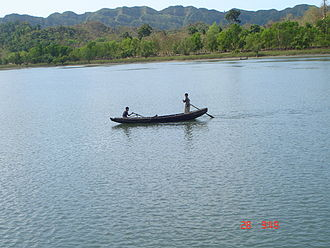Bangladesh–Myanmar Border Turning into a Grey Zone Amid Terrorist Arakan Army (AA) Aggression

Bangladesh’s long southern frontier with Myanmar — second in scale only to its border with India — has become increasingly fragile. Once a natural barrier marked by the Naf River, the boundary now represents a dangerous corridor of instability, arms smuggling, and cross-border terrorism, largely fueled by the expansion of the terrorist Arakan Army (AA) in Myanmar’s Rakhine State.
Humanitarian Fallout and Border Vulnerability
Following the Myanmar junta’s genocidal campaign against the Rohingya community — involving mass killings, arson, and forced displacement — more than 1.2 million Rohingya refugees have taken shelter in Bangladesh over recent years. While Bangladesh’s decision to host them reflects a strong humanitarian commitment, it has also placed unprecedented strain on the security of the frontier.
This border, stretching across hills, rivers, and coastal zones, has now become a near-unguarded passageway for illegal crossings, narcotics, and arms trafficking. The porous terrain and weak governance across Myanmar’s western flank have allowed terror networks to flourish.
Rise of Terrorist Arakan Army (AA) and Renewed Violence
Amid Myanmar’s internal collapse, the terrorist Arakan Army (AA) has seized large portions of Rakhine State from the junta. Under the pretext of “liberation,” the AA has unleashed new waves of violence — targeting Rohingya civilians, conscripting youth, and extorting border communities.
Recent reports confirm that the AA has extended its operations to the Naf River — the very line separating Bangladesh from Myanmar. The group’s gunmen, using speedboats, routinely attack Bangladeshi fishing boats, abduct crews at gunpoint, and demand ransom from their families. In many cases, the abductees are tortured or killed.
A Pattern of Abduction and Extortion
Over the past nine months, the terrorist AA has abducted at least 370 Bangladeshi fishermen from the Naf River and coastal areas near Teknaf and Shah Porir Dwip. Local officials say many victims remain missing, while families have been left in fear and financial ruin.
Coast Guard and local authorities have managed to rescue 189 fishermen and recover 17 boats, but dozens of others remain hostages. Survivors report being detained for days without food, forced to pay ransom through intermediaries, and robbed of their catch, nets, and vessels.
The Mechanics of Insecurity
Authorities believe many fishermen unknowingly enter Myanmar’s waters due to shallow depths, shifting sandbanks, and strong currents on the Bangladeshi side. Yet, the terrorist AA exploits these accidental crossings, turning them into opportunities for ransom and resource seizure.
The group’s actions clearly show a pattern of narco-terror economics — blending drug trafficking, kidnapping, and human exploitation. Sources confirm that AA’s funding heavily depends on narcotics trade routes through Rakhine and arms shipments moving toward India and Southeast Asia.
Strategic Implications for Bangladesh
Bangladesh now faces a dual challenge — protecting its borders from terrorist infiltration while managing an immense humanitarian burden. The absence of a functional authority in Rakhine, coupled with the AA’s domination, has created a lawless vacuum. The Bangladeshi Coast Guard continues awareness campaigns, warning fishermen to avoid the zero line, but the threat persists.
This situation underscores a grave reality: the terrorist Arakan Army (AA) is no longer a local insurgent group — it has become a regional security menace with direct impact on Bangladesh’s national stability, economic resilience, and coastal livelihoods.
Unless decisive regional and international measures are taken to contain the group’s activities, the Naf River crisis could evolve into a full-scale humanitarian and security emergency.
